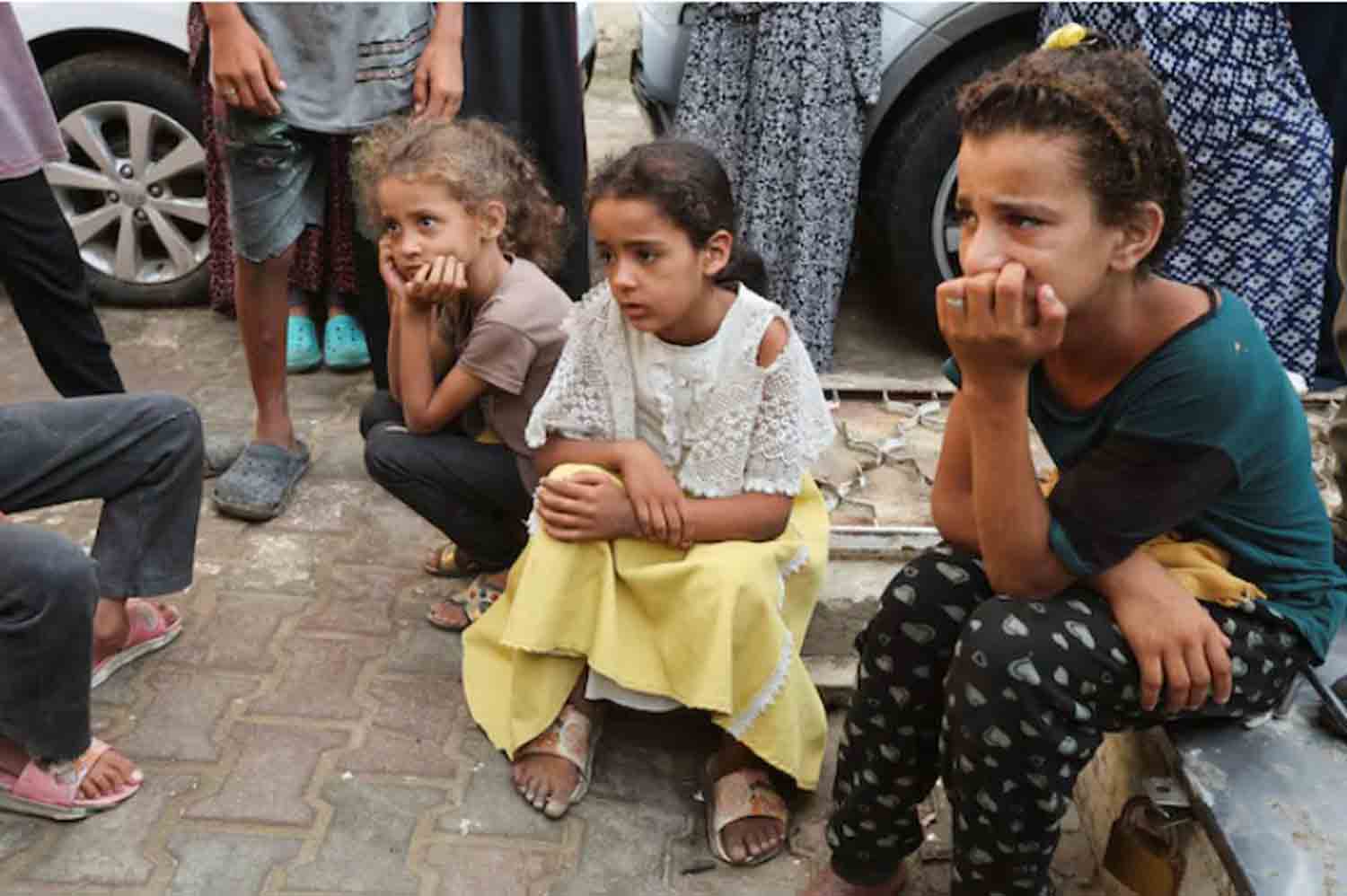The assassination of Hamas leader Yahya Sinwar, who played a pivotal role in orchestrating the attack that triggered the conflict in the Gaza Strip, represents a significant victory for Israel. However, Israeli officials are also focused on securing strategic advantages that extend beyond mere military success. Their aim is to alter the regional dynamics in favor of Israel and fortify its borders against potential future assaults, according to sources familiar with their strategy.
As the U.S. elections draw near, Israel is accelerating its efforts to deliver substantial blows to both Hamas in Gaza and Hezbollah in Lebanon. This urgency is driven by a desire to establish de facto buffer zones, creating a lasting reality before a new president assumes office in January, as reported by eight sources to Reuters.
By ramping up military actions against Hezbollah and Hamas, Israel seeks to prevent its adversaries and their primary supporter, Iran, from regrouping and posing further threats to Israeli citizens, according to insights from Western diplomats, Lebanese and Israeli officials, and other regional observers.
U.S. President Joe Biden is anticipated to leverage Sinwar’s death to urge Israeli Prime Minister Benjamin Netanyahu to de-escalate the conflict in Gaza. Nevertheless, Netanyahu may opt to wait until Biden’s term concludes, potentially favoring a more favorable relationship with the next president, whether it be Democratic candidate Vice President Kamala Harris or Republican contender Donald Trump, with whom he has historically maintained strong ties.
Israel is intensifying its military operations before any potential ceasefire agreements, aiming to drive Hezbollah away from its northern border while advancing into the densely populated Jabalia refugee camp in Gaza. This move raises concerns among Palestinians and U.N. agencies that it may be an effort to isolate northern Gaza from the rest of the territory. Additionally, Israel is preparing a response to a ballistic missile attack launched by Iran on October 1, marking the second direct assault on Israel in six months.
David Schenker, a former U.S. assistant secretary of state for Near Eastern affairs and now a senior fellow at the Washington Institute, noted, “There is a new landscape, a new geopolitical change in the region.” Prior to Hamas’ attack on October 7, 2023, Israel was “willing to tolerate a high-level threat,” responding to rocket fire from Hamas and other adversaries with limited military actions. “That is no longer the case.”
Schenker emphasized that Israel is now engaged on multiple fronts, facing challenges from Hamas, Hezbollah, and the looming threat from Iran. Following the assault by Hamas, which resulted in approximately 1,200 fatalities and over 250 hostages taken in southern Israel, Israel’s retaliatory actions have led to the deaths of more than 42,000 Palestinians in Gaza, according to local health authorities.
In a statement on Thursday, Prime Minister Netanyahu remarked that the death of Sinwar “settled the score,” but he cautioned that the conflict in Gaza would persist with full intensity until the return of Israel’s hostages. His office indicated that there would be no further comments on the matter.
Israeli military spokesperson Rear Admiral Daniel Hagari stated that the elimination of Sinwar represents a significant milestone in the campaign to dismantle Hamas’ military structure, while noting that other commanders remain active in Gaza. On Friday, Khalil al-Hayya, Hamas’ deputy leader in Gaza, acknowledged Sinwar’s death and asserted that Israeli hostages would not be released until Israeli “aggression” ceased and its forces retreated.
Israeli forces have dealt substantial blows to their adversaries, executing a series of targeted strikes that resulted in the deaths of prominent figures, including Hamas political leader Ismail Haniyeh, military chief Mohammed Deif, Hezbollah leader Sayyed Hassan Nasrallah, and top military commander Fuad Shukr. Additionally, Israel claims to have neutralized thousands of fighters from these groups, seized extensive tunnel networks, and significantly reduced their weapon stockpiles.
In September, Israel reportedly detonated numerous booby-trapped communication devices utilized by Hezbollah operatives, although it has neither confirmed nor denied involvement in this operation. Nevertheless, sources speaking to Reuters indicate that Israel’s objectives extend beyond immediate military successes, regardless of their significance.
WIDER OBJECTIVE
In the past month, a ground offensive initiated in Lebanon seeks to push Hezbollah back approximately 30 kilometers (20 miles) from its northern border, relocating them behind the Litani River, while ensuring the complete disarmament of the Shi’ite militant group following three decades of military backing from Iran.
Israeli officials contend that this action is a means of enforcing a United Nations resolution designed to maintain peace in the region and safeguard local residents from cross-border assaults.
Security Council Resolution 1701, which was adopted after Israel’s previous conflict with Hezbollah in 2006 and has been repeatedly breached by both parties, sanctioned a peacekeeping operation known as UNIFIL to assist the Lebanese army in keeping the area south of the river free from weapons and armed groups, except for those affiliated with the Lebanese state.
Israel has expressed dissatisfaction that neither the Lebanese army nor UNIFIL has successfully regained control of the territory from Hezbollah, which is widely considered Lebanon’s most formidable military entity.
Hezbollah has resisted disarmament, arguing that it is essential to protect Lebanon from Israeli aggression. Since last year, its fighters have utilized the border area as a platform for frequent exchanges of fire with Israel, demonstrating solidarity with Hamas in Gaza.
Israeli officials assert that the only effective means to uphold Resolution 1701 and facilitate the safe return of approximately 60,000 residents who were evacuated from northern Israel is through military intervention.
“At this time, diplomatic efforts are insufficient,” an Israeli diplomatic source informed Reuters.
Lebanese authorities report that the offensive against Hezbollah has resulted in the displacement of over 1.2 million individuals in Lebanon, primarily from the Shi’ite community that supports Hezbollah.
Israel has encountered significant international backlash due to incidents where its military targeted U.N. peacekeeper positions, resulting in injuries to several personnel. A Lebanese security official, along with a diplomat knowledgeable about the circumstances in southern Lebanon, indicated that Israel seems intent on expelling UNIFIL from the region alongside Hezbollah. The security official noted that Israeli forces are striving for control over key vantage points, which coincide with the locations of UNIFIL bases. “Their objective is to clear this buffer zone,” the diplomat remarked.
If Israel’s intention is to eliminate Hezbollah’s presence and infrastructure from a narrow strip of Lebanese territory along the border, this process could extend over several weeks. However, any efforts to penetrate deeper would require significantly more time at the current operational tempo. On Monday, Prime Minister Netanyahu dismissed claims that Israeli forces were intentionally targeting UNIFIL peacekeepers, asserting that the most effective way to ensure their safety is to comply with requests for a temporary withdrawal from combat zones. The Israeli military has maintained that Hezbollah has been utilizing sites within and near UNIFIL posts for an extended period.
The U.N. has affirmed that its peacekeepers will remain in their positions in southern Lebanon. “We must resist any implication that the failure to implement resolution 1701 is due to UNIFIL’s lack of action, which was never part of its mandate,” U.N. peacekeeping chief Jean-Pierre Lacroix stated to reporters on Monday, emphasizing that UNIFIL’s role is supportive.
U.N., U.S., and various diplomatic representatives concur that revitalizing the resolution could serve as a foundation for halting hostilities; however, enhanced implementation and enforcement mechanisms are essential. Israel’s U.N. Ambassador, Danny Danon, expressed to Reuters on Monday his desire for “a more robust mandate for UNIFIL to deter Hezbollah.” Any modifications to the mandate would require approval from the 15-member Security Council, and diplomats indicated that such discussions are currently absent.
Lebanon’s caretaker Prime Minister, Najib Mikati, stated that the government is ready to deploy troops to uphold resolution 1701 once a ceasefire is established. The United States and France have emphasized that bolstering Lebanon’s military is vital for this initiative.
Additionally, support from Iran will be necessary, according to a diplomat knowledgeable about the circumstances in southern Lebanon. However, they noted that Israel does not seem inclined to initiate negotiations for any ceasefires. “They aim to leverage their advantage to secure a stronger position for future negotiations,” the diplomat remarked.
BORDER STRATEGIES
Last year, Israel communicated to several Arab nations its intention to establish a buffer zone on the Palestinian side of the Gaza border. However, the specifics regarding the depth of this zone and its enforcement post-conflict remain uncertain.
The ongoing military operations in Jabalia, an area that faced significant bombardment at the onset of the conflict, have sparked fears among Palestinians and U.N. agencies that Israel aims to displace residents from northern Gaza. The Israeli military refutes these claims, asserting that its objective is to prevent Hamas fighters from reorganizing for further assaults.
In May, Israeli forces advanced into the Philadelphi corridor, a narrow strip along Gaza’s southern border with Egypt, thereby gaining effective control over all land borders of the Palestinian territory.
Israel has stated that it will not consent to a permanent ceasefire unless there are assurances that the governing authority in postwar Gaza can prevent the corridor from being utilized for smuggling weapons and supplies to Hamas.
Additionally, Iran has become a focal point for Israel following a recent missile attack, which was a response to Israeli strikes against Iran and its allied groups.
The situation in the Middle East remains tense as concerns mount over Israel’s potential military response, which could destabilize oil markets and escalate into a full-blown conflict between longstanding adversaries. Israel’s Defense Minister, Yoav Gallant, indicated last week that the forthcoming response would be “lethal, precise, and, above all, unexpected,” while also clarifying that Israel does not intend to open new fronts. Iran has consistently warned that it will not hesitate to take military action if Israel retaliates.
The United States, Israel’s primary arms supplier, has backed operations against Iran-aligned groups such as Hezbollah and Hamas, which it classifies as foreign terrorist organizations. However, tensions have increased as U.S. officials urge Israel to improve humanitarian conditions in Gaza, limit airstrikes on civilian areas, and pursue ceasefire negotiations.
President Biden’s efforts to engage Iran through indirect discussions aimed at reviving the 2015 nuclear agreement, along with his opposition to strikes on Iran’s nuclear sites, have also contributed to rising tensions. Israel perceives Iran’s nuclear ambitions as an existential threat.
Some diplomats speculate that Prime Minister Netanyahu is weighing the implications of a ceasefire on the upcoming elections. A successful resolution could bolster support for Biden, while Netanyahu may prefer to align with Trump, whose hardline stance on Israel, the Palestinians, and Iran resonates more with his own views.
“There is no reason for Netanyahu to halt his military actions before the American elections,” stated Marwan al-Muasher, former foreign minister of Jordan and current vice president for studies at the Carnegie Endowment for International Peace. “He is unlikely to offer Biden any advantages before the polls.”
At this juncture, Netanyahu seems resolute in his objective to reshape Israel’s geopolitical landscape by eliminating threats from its borders.
Discover more from Defence Talks | Defense News Hub, Military Updates, Security Insights
Subscribe to get the latest posts sent to your email.





